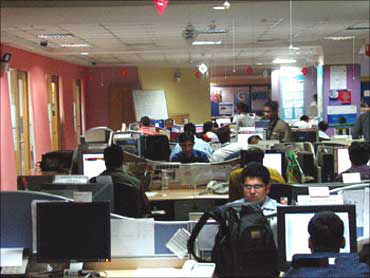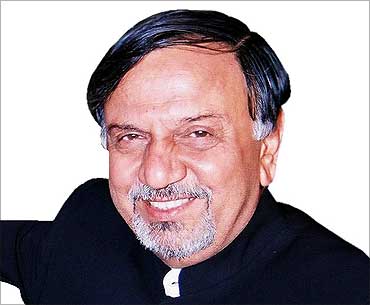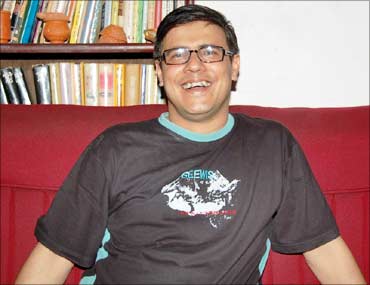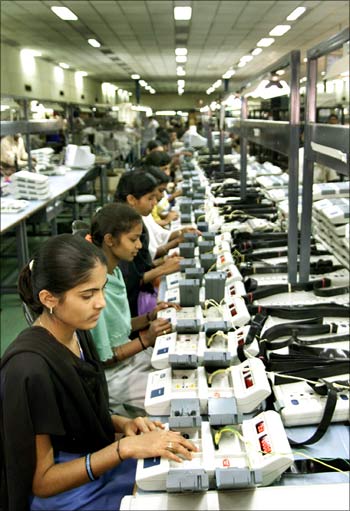
Portraying the shortage of right talent for companies to hire, a recent study claims that only 18 per cent of the fresh technical graduates surveyed in India possessed the right skills for jobs in information technology services companies.
The study, conducted by assessment technology company Aspiring Minds, which covers over 40,000 technical graduates find that a majority of fresh engineering graduates require additional training to be eligible for any job in the IT/ITeS sector.
The employability study was based on results of a computer-based test, called AMCAT, conducted for engineering and Master in Computer Applications students (in the final year) across 12 states in the country.
Employability refers to skills like English communication, quantitative skills, problem-solving skills, and computer science and programming skills, which fresh graduates must possess to get employed by firms.
Employability of these graduates with regard to IT product companies is as low as 4.22 per cent, the study said.
So what does the aam aadmi think about this survey? Do they agree with the findings or do they think they are off the mark?
Rediff.com spoke to a cross section of the people on the issue. Click NEXT to know what people had to say on the issue. . .

Shailesh Gandhi
Central Information Commissioner
I am not surprised at all by the survey results.
This is but natural for India where approximately 20 per cent of engineering courses consists of information technology and IT services. Come to think of it, this is quite a healthy figure, actually.
Under no circumstances should a country have 100 per cent people in the IT, right?
What nation will that be which has people skilled in information technology only? Who will build our roads and bridges then? Who will teach us to run our machineries?
As an Indian, I think what our country needs is more and more people skilled in a workable knowledge of the computers. One should know how to use such an effective machine to his/her advantage.
We, of course, need engineeers who understand and can write intricate software programmes. . . no doubt, but to a certain extent only. However, what is more useful is the knowledge to operate the computers well.
. . .

Amitava Bhattacharya
Former IIT-ian, entrepreneur
To me, these percentages are not that significant. They don't always reflect the true picture.
I am an IIT-ian and take it from me, in the IIT we did not necessarily get specialised training to write intricate software.
Rather, we learnt how to handle a stituation effectively by the dint of our common sense and logic.
IITs or any technical institutes do just that.
I am quite certain that handling an IT job is no rocket science. What is needed is hard work, patience, one's capacity to grasp any problem and to come up with an effective solution.
We learnt all the technical expertise while we were in our respective jobs.
While I was hired by Tata Consultancy Services, they asked me if I had the willingness to be a good trainee. Training happens to be an indispensable component of any successful IT company.
Hence, whether a tech graduate will do well or not depends on whether s/he receives good training post studies.
Therefore, one must comment on these survey results only after taking all these aspects into consideration.
. . .

Yajnaseni Chakraborty
Journalist
We tend to ignore the fact that many tech graduates are going out of the country. Therefore, those who are left are not the cream.
In India, upgradation of infrastructure of educational institutions rarely happens and there always remains a huge gap between the information technology industry as such and the places from where it recruits staff.
At present, private engineering colleges are mushrooming fast. More often than not, they lack in cutting edge tools. Hence students who go to such colleges fail to attain the necessary skills.
The system of training offered to them there is also archaic.
Hence, only a meagre percentage of them can fit themselves into IT jobs at a later stage in their lives.
I think government of India should come up with a system of monitoring these institutes and should launch a process of evaluation.
Those institutes that would fail to possess the 'prescribed' standards of training should either be blacklisted or should be disallowed to function.
. . .

Sankar Prasad Ghosh
Teacher, Jodhpur Boys' High School
These figures don't surprise me at all. In fact, these are quite in sync with my expectations.
IT, at present, is a craze in our country. People want to be associated with the information technology industry some way or the other.
Hence, even students who score poor marks in the Class XII examination somehow manage to get themselves admitted to private engineering colleges, if not anything else.
As a result, they never get 'skilled' in true sense of the term for their future jobs in the IT industry.
Having said this, I must also point out that most of the private engineering colleges that operate in India are not at all fit for imparting the right kind of training to the students. They lack proper infrastructure, faculty, et cetera.
How can we expect ill-equipped educational institutions to help the students gain IT skills?
This is where the government should step in and take some concrete steps to either stop these so-called below-average private engineering colleges from functioning or to help them accomplish the desired standards of education.
. . .

Meghatiti Banerjee
Student
I am not a meritorious student at all. I never aspired to get into any of the technical institutes of the country, ever.
But I always heard they are the best and that only the cream of the students get to study there. However, this survey says just the opposite.
I come from a low middle class family. Raised by a single parent, I often shed silent tears seeing Ma struggling to make both ends meet.
I am studying journalism in one of the mediocre colleges of Kolkata. I could have 'bought' a seat in one of the better ones but I couldn't afford it.
I want to raise a question to the government -- isn't it the government's responsibility to establish a parity among different educational institutions across India, curricula notwithstanding?
Shouldn't the government try to solve the problems that ail these institutions and see to it that students who go there achieve excellence?
Isn't it the education minister's prerogative to ensure that people's money is not wasted and not-so-rich students like us suffer endlessly? What kind of democracy is this?
. . .

Suvojit Roy
CEO, ORION Entertainment
I am not at all surprised by the survey results. Degrees, technical or otherwise, only help one get a job. Real training takes place only when one is on the job.
I am a management accountant but I am earning my living out of entertainment industry.
In my long and multi-faceted career, I have seen many ordinary graduates climbing the highest rung of success with effortless ease whereas many academicians have failed miserably to achieve anything in their professional lives.
The king of retail business Kishore Biyani had said once that he does not like hiring MBAs as they are only good at presentations and never at solutions.
In the industry that I belong to, I come across many chief executive officers, who are just graduates.
This only establishes the fact that one goes to the top by virtue of one's dedication, determination, discipline and vision.
Life stories of many successful industrialists and entrepreneurs are cases in point.
Whether it is IT or any other industry, success depends on one's aptitude only and nothing else.